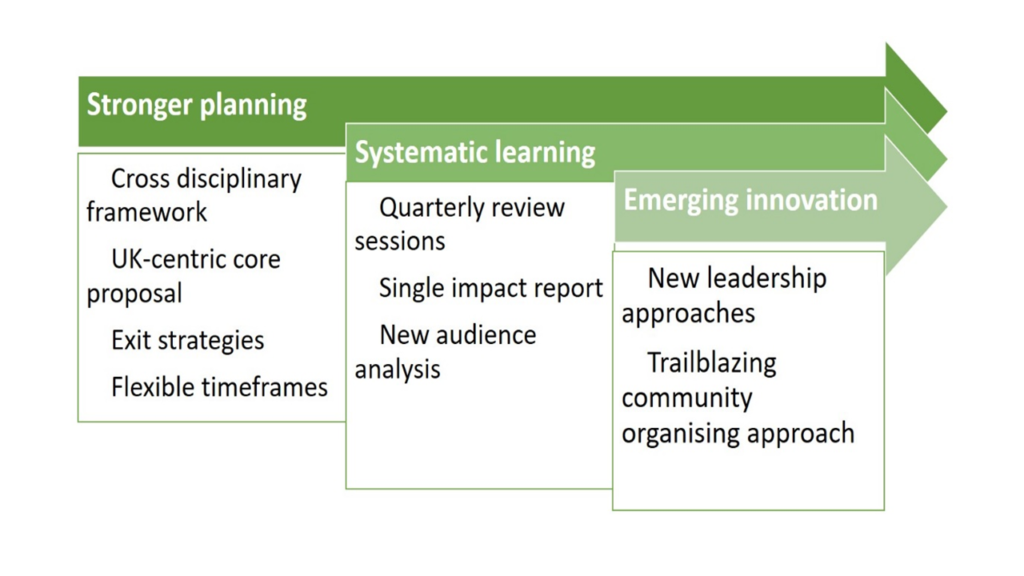As practitioners in campaign effectiveness, we have observed that busy campaigners instinctively prioritise delivery of strategy and tactics, with reflection and capturing ‘learning’ sometimes slipping down the ‘to do’ list. We are firm believers in the value of campaign learning and in this blog share four insights into how it can be manageable in the busy work of social change.
These insights are drawn from our recent joint experience of evaluating Amnesty International UK’s ‘I Welcome’ campaign for refugee rights.
Co-produce strong two-way learning through engaging both client and evaluator
Amnesty UK (AIUK) is bucking the sectoral trend of housing monitoring, evaluation and learning (MEL) specialists in a separate team. Recognising that the complexities of human rights campaigning require a distinct approach, it has invested in a specific MEL role within the campaign team. It is focused on developing and supporting learning approaches, including facilitating reflective discussions throughout the campaign lifecycle, freeing up campaign leaders to actually participate.
For signature campaigns, AIUK still engages external evaluators to supplement internal MEL with independent analysis. For the ‘I Welcome’ evaluation, the in-house campaigns MEL expert played a bridging role between the evaluation team and the internal reference group, contributing to question sets, reviewing emerging results, and resetting forward direction as needed. In one instance, the internal reference group pushed back regarding emerging findings – this intervention was welcomed as it helped the evaluators review and reaffirm how robust the evidence underpinning their opinion was. Importantly, this additional conversation helped reassure the Amnesty team, building confidence to take on the evaluation findings and recommendations.
Build nimble consultation processes as external crises can impact your approach
The first wave of the Covid-19 pandemic in March 2020 led to a ban on non-essential travel, and most in-person meetings and almost all workplaces were shut. This impacted the depth and breadth of planned stakeholder engagement. In some cases, partner organisations were absorbed by frontline response and, in others, the necessary move to remote consultation made participation unsuitable. Pivoting the approach by identifying alternative interviewees enabled us to still gather rich insights, whilst remaining on track to deliver learning in time to influence development of the next campaign.
Actively learn from past evaluations as well as current campaign efforts
AIUK seeks to continuously improve the effectiveness of campaigns, actively implementing recommendations from previous evaluations alongside wanting to identify its role in current and future impact. The last signature campaign evaluation advocated more robust ways of working. By implementing the three-pronged methodology outlined in Figure 1 below, AIUK laid the foundations for stronger ‘I Welcome’ campaign impact.
AIUK takes an iterative and pragmatic approach to developing MEL for campaigns, including evolving existing reporting requirements to promote richer analysis and learning. During
‘I Welcome’, a learning cycle was introduced through quarterly reflection and planning sessions. This enabled key players to analyse results through the campaign lifecycle, including understanding what was working and what was not, and using this data collection and analysis to inform forward planning, course correcting where needed.
Whilst the ‘I Welcome’ evaluation recommendations are rooted in learning, they are deliberately forward-looking, in line with AIUK’s developing direction on greater inclusivity, a new political landscape, future-proofed processes and a distributed organising model.
Ensure learning and forward direction are subsequently shared widely
Knowing that embedding learning takes time and intentional effort, we built in additional scope to disseminate evaluation results, whilst remaining within budget. Following delivery of the formal evaluation report, the internal campaign steering group produced a response to the recommendations and both were presented to a series of stakeholder groups including the senior management team, a reference group of expert friends, the project group who had delivered this campaign and the team who will lead future campaigns, with resulting feedback added to the evaluation evidence and implementation plan.
Remember learning is a cycle so build in preparation for the next learning wave as part of your campaign plan. As a result of this campaign evaluation accelerating internal thinking, AIUK is challenging itself to embed activists and rights holders more consistently into its forward approach to developing campaigns, as well as more short-term feedback loops towards even richer learning. Watch this space for developments.
This contributor blog was jointly written by Kathleen Christie, an independent consultant and SMK senior associate @kathchristie3 and Ruth Dawson, Campaign Strategy & Evaluation Manager at Amnesty International UK @RuthNDawson1 @AmnestyUK

Figure 1: A more robust methodology as recommended in the last signature campaign evaluation


